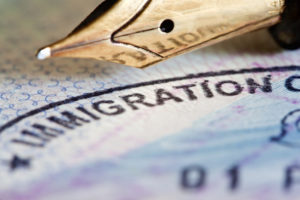 U.S. Citizenship and Immigration Services (USCIS) has announced that the initial registration period for the fiscal year (FY) 2022 H-1B cap will open at noon Eastern on March 9 and run through noon Eastern on March 25, 2021. USCIS intends to notify selected registrants by March 31st and permit filings from April 1, 2021.
U.S. Citizenship and Immigration Services (USCIS) has announced that the initial registration period for the fiscal year (FY) 2022 H-1B cap will open at noon Eastern on March 9 and run through noon Eastern on March 25, 2021. USCIS intends to notify selected registrants by March 31st and permit filings from April 1, 2021.
This registration process will not apply to H-1B transfers (between employers) or extensions of status applications. It will only impact new H-1B visas subject to the annual quota or “cap” of 65,000 visas (Regular cap) and an additional cap of 20,000 H-1B visas available for “specialty worker” beneficiaries with advanced degrees from US colleges or universities (US Masters cap). Exempt from the H-1B cap and this registration proposal are 6,800 H-1B1 visas, set aside from the 65,000 regular cap, for Chile and Singapore nationals. Moreover, specialty workers who will be employed at an institution of higher education (as defined in section 101(a) of the Higher Education Act of 1965, as amended), or a related or affiliated nonprofit entity, and workers who will be employed at a nonprofit or governmental research organization, are exempt from the H-1B cap and this registration proposal.
Employers seeking H-1B workers subject to the FY 2022 cap (for terms of employment starting on October 1, 2021) will complete an online registration form that solicits basic data about the company and the prospective H-1B employee/beneficiary (including whether he or she holds a qualifying advanced degree) and pay $10 registration fee for each beneficiary. Employers will file a separate registration for each proposed H-1B worker and, per current rules, employers will be prohibited from submitting more than one registration per H-1B worker. The H-1B random selection process, if needed, will then be run based on the submitted registrations. Only employers with selected registrations will be eligible to file H-1B cap-subject petitions on or after April 1, 2020. USICS may determine it is necessary to continue accepting registrations, or open an additional registration period, if it does not receive enough registrations and subsequent petitions projected to reach the numerical cap.
Last year, in its inaugural implementation of the H-1B registration process, USCIS received over 275,000 registrations by the end of March. However, due to the impact of the COVID-19 pandemic, USCIS received an insufficient number of H-1B cap-subject petitions during the initial 90-day filing period, and announced, on August 14, 2020, an additional round of selections from registrations held in reserve.
As we previously mentioned in our recent blog post, USCIS has delayed the effective date of the “H-1B weighted lottery rule” until December 31, 2021, which, if left intact, will change the current random lottery to a weighted lottery based on the offered wage level. USCIS will apply the regulations currently in place (random selection) to the initial registration period, and, any subsequent registration period for the FY 2022 registration process that takes place before Dec. 31, 2021.

